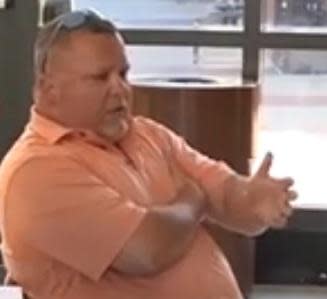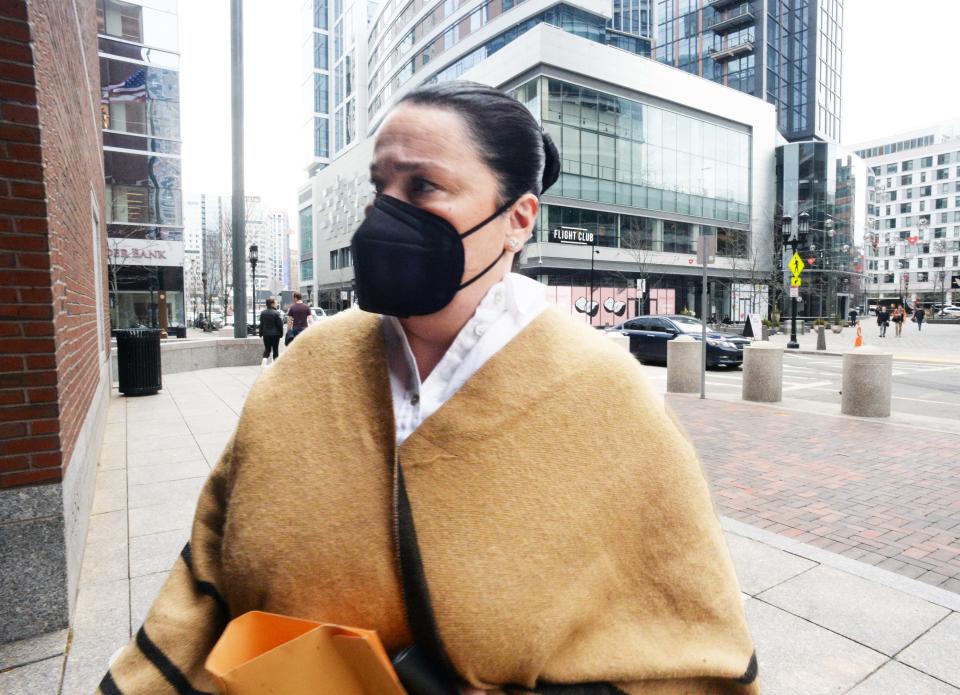David Hebert says he was key to the Jasiel Correia case. He's asking for no jail time.
- Oops!Something went wrong.Please try again later.
BOSTON — Local businessman David Hebert, the last of four co-defendants in the fraud and corruption case against Jasiel Correia II to face sentencing, was not the first one in the former mayor’s inner circle to start cooperating with federal investigators in 2019.
But it wasn’t long before Hebert became a cooperating witness against his former friend and the sitting mayor, after Hebert learned he was himself the subject of a grand jury investigation.
That detail and others involving the role Hebert played in the eventual conviction of former mayor Correia on charges of fraud and bribery was laid out in a partially redacted 56-page sentencing memorandum filed by Hebert’s attorney, R. Bradford Bailey on Wednesday.
Hebert, a Westport resident and owner of the real estate company Hanover Properties, is scheduled for sentencing Wednesday, June 15, before federal District Court Judge Rya W. Zobel.
It’s the 11th rescheduled sentencing date for Hebert. He faces counts of extortion, extortion conspiracy and lying to federal investigators for his role in Correia’s pay-to-play scheme to shake down marijuana companies looking to set up in Fall River. Correia is currently serving a six-year sentence in a New Hampshire federal prison and is appealing his conviction.

Hebert has been out on $50,000 unsecured bail since his arraignment and subsequent guilty plea in a September 2019 plea agreement that indicated he would cooperate with the federal government.
Paper trail to prison: After his arrest, Jasiel Correia talked himself into deeper trouble
Wants no time in prison
In the sentencing memorandum, Hebert is seeking no jail time, and may not see incarceration, just as co-defendants Tony Costa, Hildegar Camara and Genoveva Andrade were spared prison sentences by federal District Court Judge Douglas Woodlock.
But unlike Costa and Camara, who were sentenced to home confinement for their roles in the marijuana extortion plot, Hebert is asking for two years' probation, a $25,000 fine and $61,000 forfeiture, the amount he received in a kickback in the form of a forgiven mortgage.
Hebert was never called to testify against Correia in the former mayor's four-week trial in the spring of 2021. The public has only limited details of the role he played in the federal investigation that spanned from late 2016 or early 2017, when federal investigators began looking into Correia's smartphone app company SnoOwl, until this past April 5 when Correia went to prison.
While it was anticipated he would testify at former Correia chief of staff Andrade’s trial, she ended up taking a plea deal.
It's unknown at this time what the federal prosecutors will be seeking for punishment. As of Sunday evening, they had not filed their own sentencing memorandum.
'We had the receipts': Prosecutor Zachary Hafer's one regret from the Jasiel Correia trial
Hebert contends he played important role in the federal investigation
Well, not at first.
Correia had already been indicted and arrested on Oct. 11, 2018, for defrauding his SnoOwl investors of a few hundred thousand dollars, according to Hebert’s sentencing memo.
Former federal Assistant U.S. Attorney Zack Hafer recently told The Herald News that the marijuana extortion scheme wasn’t on the federal government’s radar until Correia held a bizarre press event against his lawyers’ advice, after which information about the shakedowns started coming to light.
By December 2018 and January 2019, Hebert was granted immunity regarding the extortion investigation and testified twice at grand jury, where he lied about having knowledge of Correia taking bribes in exchange for issuing letters of non-opposition to marijuana companies.
It was the same scenario for Costa and Camara, who lied to federal investigators, and all three would lose immunity from prosecution.
In June 2019, Costa started cooperating with the feds, and two months later Hebert got the “target letter” from the government that a grand jury was honing in on him for being the middleman to help Correia extort $25,000 from longtime friend Matthew Pichette, whose brother forgave him a $61,000 mortgage.
The bribe exchange occurred at one of Hebert’s hangouts, at the Old Firehouse Smoke Shop on Rock Street.
Hebert told investigators that Correia wanted more bribe money from Pichette, and that the letter was worth $100,000. Hebert would withdraw $6,000 from his own bank account, give it to Correia, and tell him not to ask for any more cash.
Hebert started cooperating by August 2019, testifying again in grand jury, giving investigators access to his cellphone and turning over “tangible evidence” he’d retrieved from the Purchase Street apartment he’d rented to Correia for three years before he evicted the then-mayor the day of his first arrest. (At trial, prosecutors indicated that Correia never paid Hebert rent.)
His defense attorney also indicates in the court filing that he gave agents and Hafer information on Correia’s activities and the people he associated with, and passed along “rumors on the street.”
Starting on Sept. 17, 2019, Hebert was back before a grand jury in the extortion case against Correia, testifying for two days.
On Sept. 19, 2019, Hebert’s testimony concluded at 3:19 p.m.; by 4:17 p.m. the grand jury returned a second superseding indictment that added more counts against Correia and named Andrade as a co-conspirator in the government corruption case.
His attorney said Hebert continued to cooperate with the federal government and was prepared to testify, but was never called.
Last in line: The Jasiel Correia corruption case is nearly over. One more defendant will be sentenced.
What about the safe?
In the second superseding indictment, Hebert is only identified as “middleman #2,” and that’s where the feds report that Andrade told Hebert about a safe Correia had and that she had to give him half her paycheck to keep her job.
It was a tale Hebert relayed to investigators about a conversation he had with Andrade in his vehicle.
Andrade, then Correia’s chief of staff after working as his campaign manager in two successful bids for mayor, was upset because Correia was handing out letters of non-opposition like candy, and the extorted marijuana businessmen were getting upset.
“Hebert described Andrade as 'scared, worried, and animated about Correia' when she first got into his car,” wrote Bailey in the sentencing memorandum. “She advised that Correia had promised marijuana vendors that he would not issue more than 3 non-opposition letters in Fall River (thus limiting competition and increasing the profits of the few businesses permitted to operate there) and that they were pressuring her because Correia exceeded the limit he promised and has continued to issue them notwithstanding — most recently to Pichette.”
Hebert told investigators that Andrade was “emphatic” Correia was taking cash from marijuana vendors, “in part because she had seen hundreds of thousands of dollars in cash in an open safe, he kept in his apartment.”
During one of his interviews with investigators, Hebert said the safe Andrade saw may have come from Target based on an empty box he’d found in the Purchase Street apartment after Correia was evicted.
Over lunch and at a future meeting, Andrade said she had to pay Correia half her salary to keep the chief of staff position.

Hebert has support
Portions of the sentencing memorandum were redacted at Bailey’s request due to sensitive medical information regarding Hebert’s health.
What is included in the memorandum are 20 letters from family and friends asking Zobel for leniency, including his longtime friend, John Brandt, who owns the Old Firehouse Smoke Shop; Joseph Baptista Jr., president and CEO of Mechanics Bank; and former Correia chief of staff and retired Fall River police sergeant Michael Hoar.
In most of the letters, the writers express that the charges brought against Hebert were out of character and that he is remorseful.
“Dave, as well as myself, and the residents of Fall River, had fallen under the spell of a charismatic persuasive Politian [sic]. The ex-mayor led us to believe that his roll, and the support of his roll, would result in an honest, thriving community. Unfortunately, we have come to see he only had his own financial gain in mind,” wrote Brandt.
Jo C. Goode may be reached at jgoode@heraldnews.com. Support local journalism and subscribe to The Herald News today!
This article originally appeared on The Herald News: Jasiel Correia co-defendant David Hebert asks for no prison time

